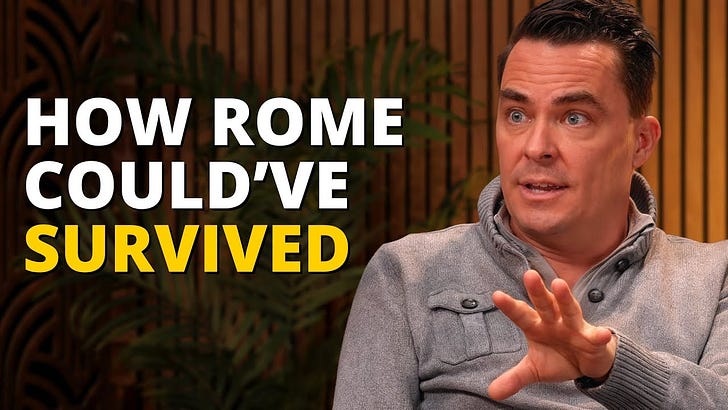
Why Rome Actually Fell: Plagues, Slavery, & Ice Age — Kyle Harper
🤖 AI Summary
Overview
Historian Kyle Harper explores the interplay of disease, climate, and societal structures in shaping human history, focusing on the collapse of the Roman Empire, the role of slavery, and the transformative effects of agriculture. He also delves into the evolutionary dynamics of pathogens, the cognitive impacts of disease, and the future implications of synthetic biology and de-extinction technologies.
Notable Quotes
- The Romans got rich without really thinking about productivity. They just wanted to extract labor, extract wealth, rather than create wealth.
— Kyle Harper, on why Rome didn’t industrialize.
- Humans can create systems of belief that will exclude others and justify almost any form of exploitation.
— Kyle Harper, on the ideological underpinnings of Roman slavery.
- Evolution is very weird, very contingent, very creative at exploiting whatever weakness we give it.
— Kyle Harper, on the unpredictable nature of pathogens.
🦠 The Role of Disease in Rome’s Collapse
- The bubonic plague (Yersinia pestis) caused catastrophic mortality rates, killing up to 60% of populations in affected regions during the Roman Empire.
- Environmental shocks, including a series of volcanic eruptions leading to a mini Ice Age,
compounded the devastation by causing famine and agricultural collapse.
- Harper argues that without these simultaneous shocks, the Roman Empire might have persisted in a form similar to China's dynastic continuity.
🌍 Climate Change and Historical Pandemics
- Volcanic eruptions in the 6th century cooled the climate by 1-2 degrees globally, disrupting agriculture and exacerbating societal stress.
- Harper highlights the importance of paleoclimate data in understanding historical events, noting how natural climate variability has shaped human history alongside anthropogenic changes.
🏛️ Why Rome Didn’t Industrialize
- Despite advanced financial markets, trade networks, and urbanization, Rome lacked the scientific foundation for sustained technological innovation.
- Harper attributes this stagnation to the absence of empiricism and applied science, contrasting Rome’s achievements with the breakthroughs of the 17th-century Royal Societies.
- Slavery, while central to Rome’s economy, did not necessarily inhibit mechanization, as argued by some historians.
⛓️ Slavery in the Roman World
- Slavery was deeply embedded in Roman society, with up to 20-30% of populations enslaved in certain regions.
- Roman slavery was not racialized but justified through legal and property frameworks, with captives from conquests forming the labor base.
- Harper discusses the psychological and systemic mechanisms that suppressed slave revolts, including manumission incentives and pervasive repression.
🌾 Agriculture and Human Health
- The transition from foraging to farming increased human population density but worsened health outcomes, introducing new infectious diseases and reducing dietary diversity.
- Harper notes that early farmers likely displaced foragers through higher fertility rates and possibly disease transmission advantages, akin to the European colonization of the Americas.
- He critiques the notion of pre-agricultural Eden,
emphasizing the trade-offs in labor, diet, and disease burden.
AI-generated content may not be accurate or complete and should not be relied upon as a sole source of truth.
📋 Episode Description
800 years before the Black Death, the very same bacteria ravaged Rome, killing 60%+ of the population in many areas.
Also, back-to-back volcanic eruptions caused a mini Ice Age, leaving Rome devastated by famine and disease.
I chatted with historian Kyle Harper about this and much else:
* Rome as a massive slave society
* Why humans are more disease-prone than other animals
* How agriculture made us physically smaller (Caesar at 5'5" was considered tall)
Watch on Youtube; listen on Apple Podcasts or Spotify.
----------
SPONSORS
* WorkOS makes it easy to become enterprise-ready. They have APIs for all the most common enterprise requirements—things like authentication, permissions, and encryption—so you can quickly plug them in and get back to building your core product. If you want to make your product enterprise-ready, join companies like Cursor, Perplexity and OpenAI, and head to workos.com.
* Scale’s Data Foundry gives major AI labs access to high-quality data to fuel post-training, including advanced reasoning capabilities. If you’re an AI researcher or engineer, learn how Scale’s Data Foundry and research lab, SEAL, can help you go beyond the current frontier of capabilities at scale.com/dwarkesh
To sponsor a future episode, visit dwarkesh.com/advertise.
----------
KYLE'S BOOKS
* The Fate of Rome: Climate, Disease, and the End of an Empire
* Plagues upon the Earth: Disease and the Course of Human History
* Slavery in the Late Roman World, AD 275-425
----------
TIMESTAMPS
(00:00:00) - Plague's impact on Rome's collapse
(00:06:24) - Rome's little Ice Age
(00:11:51) - Why did progress stall in Rome's Golden Age?
(00:23:55) - Slavery in Rome
(00:36:22) - Was agriculture a mistake?
(00:47:42) - Disease's impact on cognitive function
(00:59:46) - Plague in India and Central Asia
(01:05:16) - The next pandemic
(01:16:48) - How Kyle uses LLMs
(01:18:51) - De-extinction of lost s
